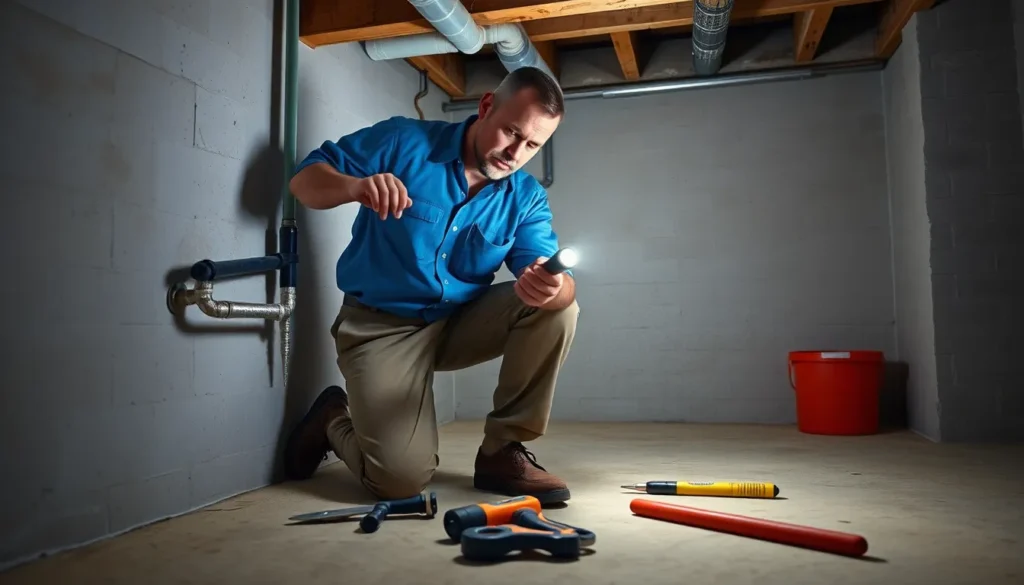Table of Contents
ToggleBuying a home can feel like navigating a maze blindfolded. Just when you think you’ve found the exit, you stumble into a pit of paperwork and inspections. Enter escrow and inspection—the dynamic duo that ensures your dream home doesn’t turn into a nightmare. Think of escrow as the trustworthy friend holding onto your cash until you’ve confirmed the house isn’t secretly a haunted mansion.
Understanding Escrow and Inspection
Escrow and inspection are crucial components in the home-buying process that ensure buyer protection. These steps provide peace of mind and can prevent significant financial surprises.
What Is Escrow?
Escrow functions as a neutral party during a real estate transaction. An escrow agent manages the funds and important documents until all conditions are met. Buyers deposit their earnest money into an escrow account, which is held until they confirm the property’s condition. This method creates accountability and security, ensuring both parties meet their contractual obligations. Once the buyer is satisfied, the funds are released to the seller, finalizing the deal.
The Role of Inspections in Real Estate
Inspections play a pivotal role in the home-buying process. A professional inspector evaluates the property’s condition, identifying potential issues that may not be visible during a casual viewing. Buyers receive a detailed report outlining necessary repairs and safety concerns. This crucial information guides their decision-making process and provides leverage for negotiation. Additionally, inspections can reveal significant problems that might affect the property’s value, ensuring buyers make informed choices before finalizing the purchase.
Importance of Escrow and Inspection in Transactions
Escrow and inspection play crucial roles in real estate transactions, protecting buyers and ensuring a smooth process. These components provide critical safeguards against unforeseen issues.
Legal Protections Provided by Escrow
Escrow offers essential legal protection in property transactions. It holds funds securely, preventing sellers from accessing the money before fulfilling contractual obligations. An escrow agent acts as a neutral party, managing not just funds but documents necessary for the transaction. Buyers can confidently deposit earnest money, knowing it remains safe until all conditions are met. Legal implications arise when this process is followed, allowing buyers to challenge transactions if sellers fail to meet terms. Clarity in the escrow process helps both parties understand their responsibilities and rights, minimizing potential disputes that could derail a sale.
Ensuring Property Condition Through Inspections
Inspections ensure buyers understand a property’s true condition before closing a deal. A qualified inspector identifies significant issues, such as structural problems or system failures, that may not be apparent during initial viewing. Inspection reports provide invaluable insights, enabling buyers to make informed decisions. These findings can also serve as leverage during negotiations, allowing buyers to request repairs or price reductions if significant defects are discovered. Evaluating a property before purchase prevents costly surprises, securing buyers’ investments in the long run. Comprehending the inspection findings establishes trust between buyers and sellers, fostering transparent transactions.
The Escrow Process
The escrow process plays a crucial role in real estate transactions. This system safeguards both buyers and sellers while ensuring transparency throughout the purchase.
Steps Involved in Escrow
- Opening Escrow: The buyer and seller agree on terms, allowing the buyer’s agent to open an escrow account.
- Deposit Earnest Money: Buyers submit earnest money into the escrow account, demonstrating commitment to the purchase.
- Document Review: The escrow agent examines necessary documents, including purchase agreements and disclosures.
- Perform Inspections: Buyers conduct property inspections to identify any underlying issues, ensuring a thorough evaluation.
- Finalize Terms: Both parties negotiate any repairs or terms based on inspection findings.
- Close Escrow: Once all conditions are satisfied, the escrow agent disburses funds to the seller and transfers property ownership to the buyer.
Each step builds on the previous one, creating a structured process that protects everyone involved.
Common Terms in an Escrow Agreement
- Escrow Account: This is the neutral account where funds and documents remain until conditions are fulfilled.
- Escrow Agent: The third party responsible for managing the escrow process, overseeing transactions.
- Earnest Money Deposit: This payment reflects the buyer’s serious intention, usually a percentage of the purchase price.
- Contingencies: These are conditions that must be met before closing, such as repairs or financing.
- Closing Disclosure: A document that outlines all loan terms and settlement costs, provided to the buyer prior to closing.
- Release Conditions: Specific requirements that must be met for the escrow agent to disburse funds.
Understanding these terms enhances clarity around the escrow process, offering insights into each party’s responsibilities and rights.
Types of Inspections
Inspections play a critical role during the home buying process. They ensure buyers are aware of any underlying issues that could affect their investment.
Home Inspections
Home inspections offer a comprehensive assessment of a property’s overall condition. Inspectors evaluate structural components, plumbing systems, electrical systems, and roofing. Buyers typically receive a detailed report that highlights major concerns and maintenance issues. These findings help buyers make informed decisions about their purchase. Most home inspections last two to four hours, depending on the property’s size. Understanding the report allows buyers to negotiate repairs or price adjustments if necessary.
Specialized Inspections
Specialized inspections target specific aspects of a property that might require deeper evaluation. These may include pest inspections, chimney inspections, or radon testing. Each type of inspection focuses on particular issues, providing buyers with in-depth insights. For instance, a pest inspection determines the presence of termites or other harmful insects. Similarly, radon testing measures radioactive gas levels, ensuring safety for occupants. Scheduling specialized inspections can address concerns that standard home inspections might overlook. By obtaining this targeted information, buyers better understand potential risks before closing the deal.
Conclusion
Navigating the complexities of real estate transactions requires a solid understanding of escrow and inspection. These two components work hand in hand to ensure buyers are protected from unexpected issues. By utilizing escrow services buyers can secure their investment and maintain peace of mind throughout the transaction. Inspections further enhance this protection by uncovering potential problems that may not be immediately visible.
Together they create a transparent process that fosters trust between buyers and sellers. This informed approach not only safeguards investments but also empowers buyers to make decisions that align with their long-term goals. Embracing these essential steps can lead to a smoother home buying experience.






